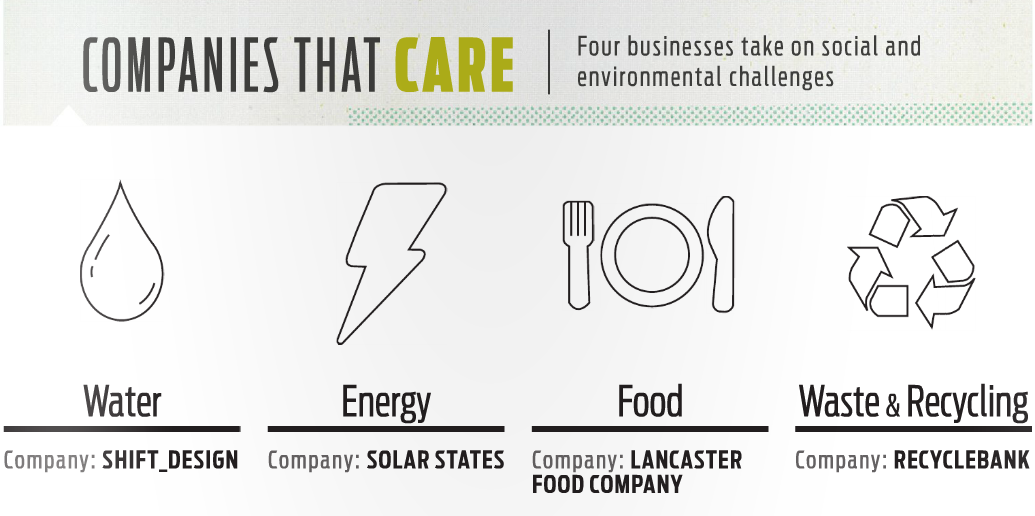Companies that Care
Water
Shift_Design
Diverting or absorbing stormwater runoff protects our rivers from pollution and prevents citywide flooding. Shift_Design splits its portfolio between environmental design work for local businesses and consumer-based products that combat this issue.
Shift_Design uses recycled components made within 120 miles of Philadelphia. One of their products, a living tile, is a planter made from aluminum, lined with burlap and filled with a specially formulated low-weight, high-absorption soil. In a city with predominantly flat-roofed rowhomes that collect stormwater and absorb heat, it could help transform problem roofs into rooftop gardens.
The Shift_Design team has designed the stormwater-absorbing living walls at 30th Street Station and the Independence Living History Center, in addition to the green roofs at URBN headquarters in the Navy Yard and Shake Shack in Center City, which is also home to their planted bicycle corral, a series of planters that are designed for bike parking ease.
Energy
Solar States
Reducing our reliance on fossil fuels is an ongoing battle, and energy efficiency, alternative fuels and new technology are all critical pieces of the puzzle.
Solar States, founded by Micah Gold-Markel, has been installing rooftop solar panels in homes, schools and businesses since 2008.
Educating Philadelphians on the benefits of solar power and making the transition to it affordable are the primary goals of the company. They are also working to create green-collar jobs in Philadelphia and support the local economy by sourcing their materials from local, independent suppliers.
Solar States has collaborated with local high schools and various nonprofits to encourage an institutional citywide switch to solar power called the Philadelphia Solar Schools Initiative.
Solar States also works with the Science Leadership Academy to educate and train high school students on the principles of solar technology, panel installation and maintenance.
They hope that the yearlong course that they have developed will be replicated by other schools nationwide.
Food
Lancaster Food Company
Hunger and poverty are entrenched problems in our society. Lancaster, Pennsylvania, an area renowned for its farmlands, has a 30 percent poverty rate in its population of close to 60,000 people, which means that roughly 18,000 of the residents are impoverished.
Software developer Charlie Crystle and brand strategist Craig Lauer founded the Lancaster Food Company in 2014 to combat local poverty and make healthy, sustainable food. They produce USDA Certified Organic breads, spreads, syrups, salsas and jams from locally sourced ingredients. Their products can now be found at more than 100 stores and restaurants along the East Coast.
Their staff is composed primarily of Lancaster residents who were living in poverty or might otherwise have had difficulty finding work due to personal history, education, literacy or language barriers. Employees are paid a better-than-living wage and have access to stock ownership in the company. Crystle and Lauer are confident that their staff of 14 will expand to over 100 in the next 18 months.
Waste and Recycling
Recyclebank
In recent years, recycling and composting have become more commonplace in the United States, but there is still a huge amount of waste that goes to landfills.
However, in 2012, the Environmental Protection Agency released a study showing that of the 250.89 million tons of waste generated during that year, only 87 million tons were recovered by recycling or composting.
Recyclebank is a company that rewards recyclers and composters with virtual points that they can redeem for sustainable products like bamboo kitchenware. Participants can also donate their points to schools to fund green projects.
The company was founded in 2004 by Patrick FitzGerald and Ron Gonen. The pilot program began in Philadelphia, where it raised the recycling rates of the West Oak Lane and Chestnut Hill neighborhoods to a reported 90 percent, up from seven percent and 35 percent, respectively. The program has since spread to all 50 states and has over four million users who have recycled roughly four billion pounds of waste.









